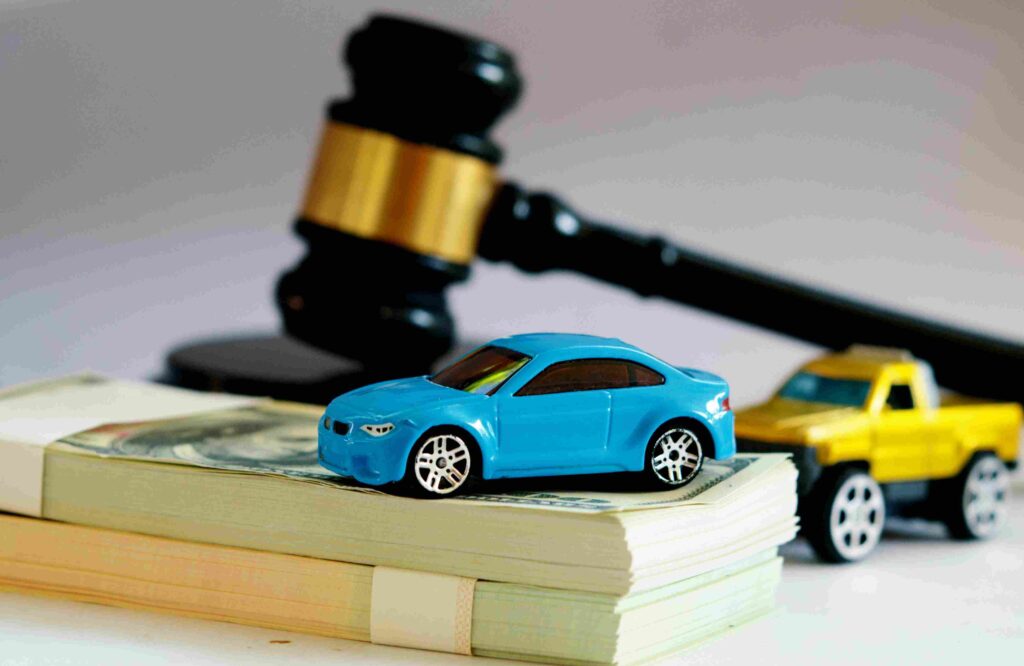Car accidents can be traumatic experiences that result in physical injuries, emotional distress, and financial burdens. As a resident of Florida, it is essential to have a comprehensive understanding of car accident lawsuits and the potential damages you may be entitled to.
Knowing your rights and the compensation you can seek is crucial for protecting your interests and ensuring you receive fair compensation for your losses. Here, you can learn more about what to consider when determining the damages you can sue for after a car accident. Understanding these key aspects will empower you to make informed decisions and seek the justice you deserve.
If you need legal assistance after an accident, our Daytona Beach auto accident attorneys are here to help. At Zimmet & Zimmet, our lawyers have years of experience representing car accident victims.
Understanding Car Accident Lawsuits
Car accident lawsuits are centered around the concept of negligence and liability. Negligence refers to the failure to exercise reasonable care, harming others. To establish liability in a car accident case, it must be proven that the other party was negligent and that their negligence directly caused the accident and resulting damages. Understanding the elements of negligence and how they apply to your case is crucial for building a strong legal claim.
The Role of Insurance Companies
Insurance companies play a significant role in settling car accident claims. Following an accident, it is common for insurance adjusters to investigate the incident, evaluate the damages, and negotiate a settlement.
However, it is important to remember that insurance companies are primarily concerned with minimizing their own financial liability. Consulting with a skilled Daytona Beach attorney can help level the playing field and ensure your rights and interests are protected throughout the claims process.
Statute of Limitations
In Florida, a specific timeframe within which you must file a car accident lawsuit is known as the statute of limitations. It is crucial to understand this timeframe as failure to file within the designated period may result in losing your right to seek compensation through the court system.
The statute of limitations for filing a car accident lawsuit is generally four years from the accident date. However, there may be exceptions and variations depending on the specific circumstances of your case. Seeking legal guidance promptly after an accident is vital to ensure compliance with the statute of limitations and protect your legal rights.
Types of Damages in Car Accident Lawsuits
When involved in a car accident, understanding the various damages available to compensate for tangible losses is crucial. Keep reading to learn what these damages are.
Economic Damages
Economic damages refer to the financial losses incurred as a direct result of a car accident. These damages are intended to compensate victims for their measurable, tangible losses. Here are some examples of economic damages commonly sought in car accident lawsuits:
- Medical Expenses: This includes costs related to hospitalization, emergency room visits, surgeries, medication, rehabilitation, and future medical care. Retaining all medical bills, receipts, and records is crucial to calculate and support your claim for medical expenses accurately.
- Property Damage: Car accidents often damage vehicles or other property involved. The cost of repairing or replacing the damaged property, including your vehicle, is considered economic damage. Keeping copies of repair estimates, invoices, and receipts is important in documenting these losses.
- Lost Wages: If the injuries sustained in the accident have caused you to miss work, you may be entitled to compensation for your lost income. This includes both past and future wages. It is essential to provide documentation such as pay stubs, tax records, and a letter from your employer to verify your lost earnings.
- Loss of Earning Capacity: In cases where the accident has left you with a long-term or permanent disability that affects your ability to earn income, you may be eligible for compensation for the loss of future earning capacity. Expert testimony and economic evaluations may be necessary to calculate these damages accurately.
Documenting and Preserving Evidence
It is vital to document and preserve all relevant evidence to support your claim for economic damages. This includes:
- Gathering and retaining all medical records, bills, and receipts for your injuries and treatments.
- Obtaining repair estimates, invoices, and receipts for property damage.
- Keeping a detailed record of missed workdays, including dates and corresponding wage loss.
- Consulting with medical and financial experts to assess the long-term impact of your injuries on your earning capacity.
By meticulously documenting and preserving evidence, you strengthen your case and provide substantiation for the economic damages you seek. Working with an experienced car accident attorney can help ensure you include all applicable economic losses and present a compelling claim for maximum compensation.
Non-Economic Damages: Compensation for Intangible Losses
In addition to economic damages, car accident victims may be entitled to non-economic damages. These damages are designed to compensate for intangible losses that are more challenging to quantify. Here are some key aspects of non-economic damages:
- Pain and Suffering: This refers to the physical and emotional distress experienced due to the accident and subsequent injuries. It includes the pain, discomfort, and suffering endured and the impact on the overall quality of life. Determining the value of pain and suffering involves various factors, such as the severity of injuries, duration of recovery, and long-term effects.
- Emotional Distress: Car accidents can cause significant emotional trauma, including anxiety, depression, post-traumatic stress disorder (PTSD), and other psychological or emotional conditions. Non-economic damages may be awarded to compensate for the emotional distress from the accident.
- Loss of Enjoyment of Life: If the accident has caused a decrease in the victim’s ability to participate in activities they once enjoyed or has diminished their overall quality of life, they may be eligible for compensation. Loss of enjoyment of life damages aims to address the negative impact of the accident on the victim’s ability to engage in hobbies, social activities, or personal relationships.
Calculating Non-Economic Damages
Calculating non-economic damages can be complex, as intangible losses have no definitive monetary value. Courts consider several factors when determining the amount of non-economic damages, including the nature and severity of injuries, duration of recovery, impact on daily life, medical evidence, and testimony from medical experts, therapists, or psychologists. The court may also consider precedent cases with similar circumstances to guide their decision.
Punitive Damages
Punitive damages serve a different purpose than economic and non-economic damages. They are intended to punish the at-fault party and deter similar behavior in the future. Punitive damages are awarded in cases where the defendant’s conduct is deemed grossly negligent, reckless, or intentionally harmful.
However, it’s important to note that punitive damages are rarely awarded in car accident cases unless the defendant’s actions were particularly egregious.
Understanding these different categories of damages, including non-economic and punitive damages, can provide insight into the various types of compensation available in car accident cases. While economic damages aim to address tangible losses, non-economic damages acknowledge the intangible harm suffered by the victim. Punitive damages, on the other hand, act as a deterrent against severe misconduct or negligence.
Factors Affecting Damages in Car Accident Lawsuits
Several key factors come into play when determining the damages awarded in a car accident case. From the severity of injuries and comparative negligence to insurance coverage considerations, understanding these factors is essential for individuals seeking fair compensation after a car accident.
The Severity of Injuries
The severity of injuries sustained in a car accident is a crucial factor that can significantly influence the damages awarded. More severe injuries often lead to higher medical expenses, longer recovery, and increased pain and suffering.
When seeking compensation, it is vital to present comprehensive medical records and documentation that accurately depict the extent and impact of your injuries. Expert testimony from healthcare professionals can further support your claim and help establish the full scope of your injuries.
Comparative Negligence
Comparative negligence is a legal principle that may affect the damages awarded in a car accident lawsuit. It involves assigning a percentage of fault to each party involved based on their contribution to the accident. In Florida, the pure comparative negligence rule is followed, which means that even if you are partially responsible for the accident, you can still seek compensation.
However, your damages will be reduced in proportion to your assigned level of fault. Understanding this concept is crucial, as it emphasizes the importance of gathering evidence to establish the other party’s negligence while mitigating any potential contributory factors on your part.
Insurance Coverage
Insurance coverage plays a significant role in determining the available damages in car accident lawsuits. The state follows a no-fault insurance system, requiring all drivers to carry Personal Injury Protection (PIP) insurance. PIP covers a portion of medical expenses and lost wages, regardless of who was at fault for the accident.
However, in severe or permanent injuries, it may be possible to step outside the no-fault system and pursue a liability claim against the at-fault party’s insurance. Understanding the limitations and coverage provided by your insurance policy and the minimum insurance requirements is essential for accurately assessing the potential damages available in your case.
Navigating the complex factors that influence damages in car accident lawsuits requires a comprehensive understanding of the law and careful consideration of the specific circumstances of your case.
Protecting Your Right to Compensation After a Car Accident
Navigating the complex landscape of car accident lawsuits requires a thorough understanding of the factors influencing damages. Individuals can better assess their potential compensation by comprehending the impact of injury severity, comparative negligence, and insurance coverage.
Gathering and preserving evidence, seeking expert testimony, and consulting legal professionals is crucial to ensure the strongest case. Remember, each car accident case is unique, and the damages awarded will depend on the specific circumstances involved. By being informed and proactive, individuals can work towards obtaining fair compensation that addresses their losses and aids in their recovery.
If you need legal representation after a car accident, we are here to help. Contact our law firm at Zimmet & Zimmet at (386) 210-3702 to schedule a free consultation to discuss your claim.
Additional Information and Reading about Daytona Beach Car Accidents
Understand Rear-End Car Accidents and Your Rights in Daytona Beach
Do I need to Hire a Daytona Beach Accident Lawyer?
What to Avoid Telling Your Insurance Company After an Accident











